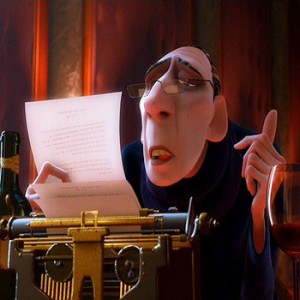Critics, fans, and the nature of reviews
Critics and fans look at things differently. No getting around that.

People forget, however, that critics are fans too. They have to be. Who would choose to spend their life talking about things they hate? Sure, there are the critics that make fun of bad media, but you have to remember that they mock the bad because they love the good.
I’m a fan. Obviously. My blog is about fan stuff; it even has “fan” in the title! But now that I am officially reviewing and analyzing and discussing the media I consume, I’d also have to consider myself a critic.
What’s the difference? I mean, I don’t want to end up like that guy in Ratatouille, who became so critical and cynical that he couldn’t even find the joy of food that made him become a restaurant critic in the first place. On the other hand, I’m not a passive receiver of information, and I certainly don’t want to be. I find as much joy analyzing a game as I do actually playing it.
Some of the difference between fans and critics might have to do with training. Now, I have a liberal arts degree, which I have painfully learned over the past year has an impact of approximately zero when it comes to finding employment. But throw me a Dickens novel or whatever and I am fully prepared to cut it to pieces and write a dissertation from its remains. Whether we realize it or not, English majors read books differently from most people.

It’s the same thing with, well, anything that can be critically reviewed. I was at the liquor store the other day, looking at the wine bottles. I’m not a wine drinker; like, I can tell the difference in taste between red and white and that’s it. So as I looked at the labels attached to the bottles, with descriptions such as, “light full but medium-bodied strong light red elderberry/huckleberry/strawberry with hints of french toast and marshmallows,” I thought I was reading gobbledygook. And to me, someone not trained in wine tasting, it was. But those wine tasters? It was their job. It was what they’d spent years learning to do. For them, the descriptions made perfect sense.
So yes, critics and fans sometimes speak a different language. That’s why I think part of a critic’s job should be learning how to speak to their audience. If you’re talking to like-minded people, sure, use all the jargon you want. Just don’t get into the mindset that using those words makes you smarter, better, or worse, “higher up” than the common masses who dare to not have taken all those long and frustrating and expensive English classes.
On the other hand, a critic should know what they’re doing. If you want to review movies… know your movies. Know things like direction and lighting and filmography, and know about actors and directors and film history. It lets you put the work you’re reviewing into perspective. Remember, media is affected by everything around it. I know a… rather embarrassing amount about video games because of this.
One last thing (as if I really want to add more to this mess of words). I’ve been seeing complaints about video game reviews a lot lately. There’s a school of thought going around that these reviews are all too biased, and the only correct review is one that is entirely objective. Like, none of the reviewer’s actual opinion should leak through, because they’re opinions and they might be wrong. And we can’t have any non-factual statements in a review written by a critic, can we?
Yeah, sorry, but no. If you want pure objective facts, look at the game’s Wikipedia page. All that training I was talking about earlier isn’t going into a 10-page explanation of how Destiny, developed by Bungie, is a first person shooter video game. When I’m looking for reviews, I’m not looking for facts — I want to see if people liked the game, and if there were any likeable elements that kept recurring from review to review.

Speaking of Destiny, here’s how I would probably review it. “Destiny is a first-person shooter (fact). It was developed by Bungie (fact). There’s a robot voiced by Peter Dinklage (fact) who is really annoying (opinion). In gameplay you run around and shoot things (fact). Running and changing weapons feels very smooth and natural (opinion). Graphics are very high-quality (fact) and they look amazing (opinion).”
(Note: I have not actually played Destiny, so all of these opinions are lies. But to some people they could be true!)
Anyway, you get the idea. Objectivity is impossible for a critic, and that’s fine. Just understand that some people won’t agree with you. But if you didn’t know that, why’d you take the job in the first place?

Lynn Bachman was born and raised in Baltimore. After reading Lord of the Rings at a young age, she has had a perpetual fondness for fantasy worlds, epic quests and magical horses. When you can tear her away from her role-playing games, she enjoys such things as drawing, horseback riding, and of course, writing. Lynn received her B.A. in Writing and Literature from Juniata College in 2013. Don’t talk to her about sports or politics. Do ask to see her video game collection. [Steam: peacefulcascade; Playstation Network: pcascade;
3DS Friend Code: 2122-6206-0737]

